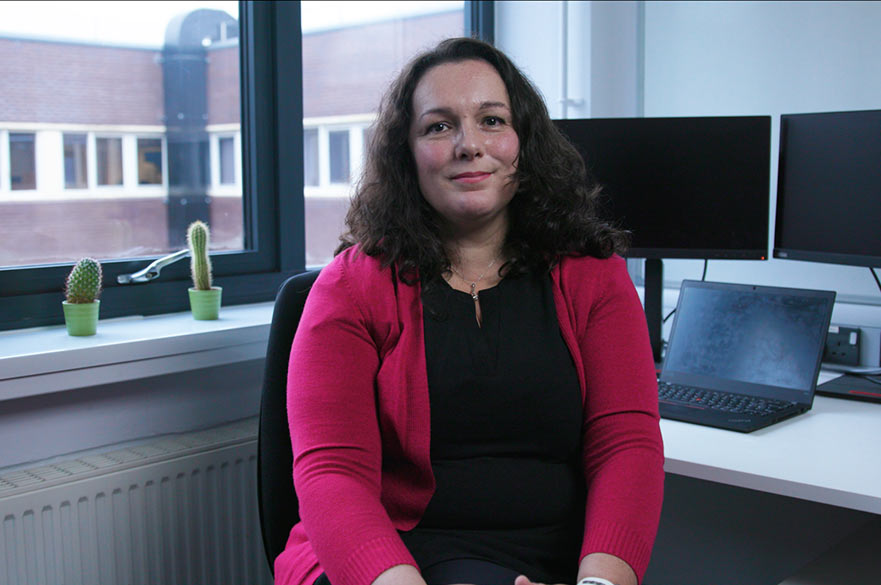Tackling substance abuse: strengthening support for those in need
Emma Smith, Doctoral Researcher
I have seen first-hand how addiction can impact people. Watching someone close to me suffer from alcoholism was incredibly hard and I've always felt more could be done to help people with addictions rebuild their lives.
What inspired my research?
My life changed when I had my first son, aged 27. I had lost my mum five years previously and my mental health suffered as a consequence. My son being born was like a light had been switched on. I was now responsible for another person who relied solely on me to provide for him. This sparked something inside me, and I decided that it was time for me to do something I'd always wanted to do - go back to school and get a good career so my children could be proud of me. I wanted to prove that even as a single parent who left school at 16, you can do anything you want if you put your mind to it.
I enrolled on an Access course at Derby College and then went on to attend Nottingham Trent University to study Psychology and Criminology and forensic mental health. I had a plan in place at the start of my academic journey that I'd be going right to the end and finish with a PhD; I wanted to go as far as I could with my education. I’ve been at NTU for seven years now and I'm currently in the third year of my PhD.
At the beginning of my PhD journey, a person who I was very close to was suffering with alcohol addiction. I have witnessed him drinking excessively, needing to have a drink as early as 6am or 7am, just to start the day. I've also seen him going through withdrawals: being sick, shaking, sweating, and having seizures. There were many times when he had tried to attend support services and rehab, but unfortunately these didn’t give him the care he needed.
We had a conversation in my kitchen one day and I ultimately asked him what he would want from services offering support for drug and alcohol users. He spoke about being passed from one service to another and the lack of communication between these services. He was attending a drug and alcohol service, seeing his GP, as well as attending services for mental health - it was just too much for him to handle. He suggested that a service that incorporated all of these factors under one main service would be more beneficial to his recovery.
Strengthening support for those in need
Talking to this person made me think of a practical research idea that could potentially help a lot of people in this same situation. I used to work in substance use services, and I always felt that more could be done to help people with substance use issues. I didn't experience many successful outcomes and always wondered what else could be done that hadn’t been implemented already.
Unfortunately, many public services have a “one size fits all” approach. For people suffering with addiction, there are many factors to consider, such as age, ethnicity, mental health, childcare responsibilities , and homelessness, as well as the addiction itself. Many of these contextual factors are ignored when it comes to providing treatment. My research has taken these factors and looked at them in terms of how they can affect people seeking and maintaining treatment, as well as whether gender is a barrier. The studies I conduct group people with similar characteristics into classes, which is followed by examining this from a gendered perspective to determine if class allocation is impacted by gender. Finally, these classes are then analysed to understand if class allocation and gender, influence whether treatment is successful.
I want to work with public service providers to enable them to tailor their treatment plans based on the individual clients’ needs and to understand what factors can impact whether treatment can be successful or unsuccessful. I hope my research will have an impact on how services provide treatment for individuals and that everyone who enters the service can have the right support that they need.
I would really like to carry on this research and conduct interviews with clients to understand what they would like from the services that they are attending. I would also like to conduct research with the homeless population as I believe that these people are an underrepresented, vulnerable population that need additional help with any substance use issues they may have.
Follow my story
My story doesn’t end here. Keep up to date with me and my research by following me on Twitter, @emmasmith148386. For anything else, please feel free to email me.
Emma Smith
Emma is a PhD candidate in the School of Social Sciences, with a focus on substance use and treatment.
She is also an hourly Paid Lecturer across undergraduate and postgraduate Psychology modules.
Meet the researchers
Forget lab coats and research papers. It's time to get personal. Meet the people behind the research and uncover fascinating truths about their experience.


Blerina Kellezi
Breaking the cycle
Explore how Blerina is helping to prevent human rights violations